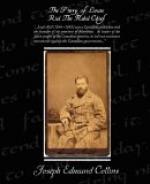“This,” he said, “is the manner in which they describe our customs, our social life, and the virtue of our women.” The women tossed their heads haughtily.
“We do what is right,” they said, “and they can slander us if they will. We shall not prove, perhaps, so easy a prey to those white gallants as they seem to suppose.” One high-spirited girl, and very beautiful, vowed that during the run of her life, she never would speak to a white man for this insult, or let him see her face. Yet, if the gossip is to be trusted, before the flowers bloomed thrice, after that, upon the prairie, she was sighing her sweet soul away, through her great gazelle eyes, for love of a sturdy young Englishman, who had taken up his abode upon the plains. And better than all the young fellow married her, and she is now one of the happiest, not to say one of the prettiest, women in Manitoba. Strong words of determination by a young woman are the most conclusive evidence that I know of the weakening of her resolve.
But Messrs Snow and Mair went on with their creditable work, and to their other good deeds it was alleged they added that of grabbing choice plots of land.
These two men were, of course, known to be the accredited agents of the Minister of Public Works; and Riel succeeded in convincing the credulous people that the Minister, indeed the whole government, were cognizant of their acts and approved of the same. “While public indignation was at its height, it was announced that a Lieutenant-Governor had been appointed for Red River, and that the man chosen was the very person through whom the chief indignity had been put upon the settlement. It was also shown with burning force by Riel that in a matter so important as the transfer of fifteen thousand people from one particular jurisdiction to another, they, the people transferred, had not been consulted. They had not, he also pointed out, been even formally apprised of the transfer.
“This Canadian Government take Red River and its half-breeds over, just as they would take over Red River and fifteen thousand sheep.” And some of the men swore terrible oaths that this change should not be without resistance, and resistance to the death.
Riel said that the determination was good.
CHAPTER IV.
Having worked the unreasoning settlers to this pitch, Riel was satisfied. Public feeling needed but the fuse of some bold step of his to burst into instant flame. As the Lieutenant-Governor drew near the territory the agitator was almost beside himself with excitement. He neither ate nor slept but on foot or sleigh, was for ever moving from one to another perfecting plans, or inciting to tumult. At the house of a prominent half-breed, while the women sat about stitching, Riel met a number of the leading agitators, and thus addressed them:
“There are two courses open to us now. One is to continue as an unorganized band of noisy disturbers; the other, to league ourselves into an organized body for the defence and government of our country.” This proposal thrilled the veins of his listeners, and pouting, coral-coloured female lips, said softly,




